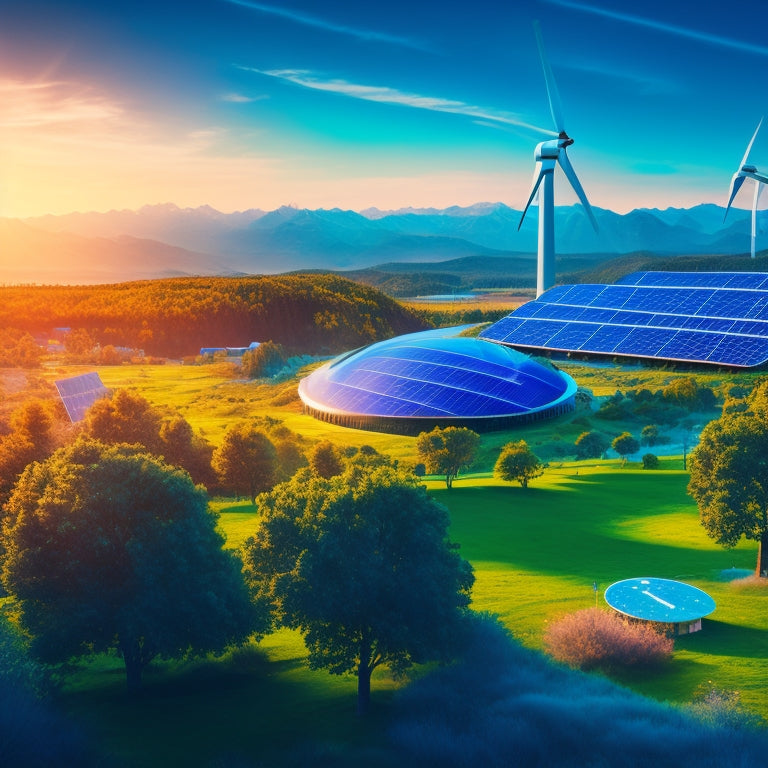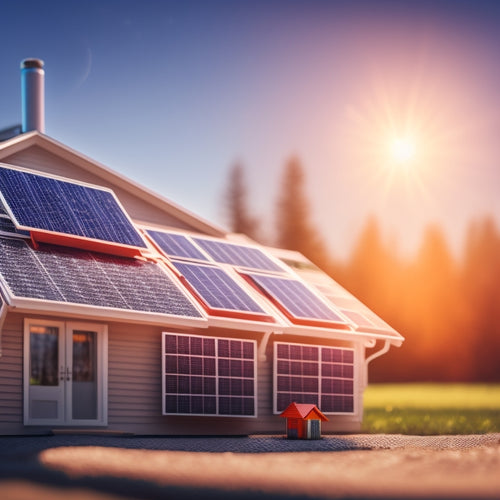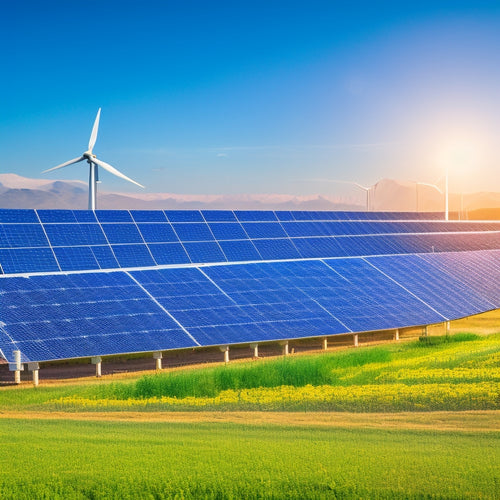
What Are the Top Renewable Energy Charging Systems?
Share
You're looking for high-quality renewable energy charging systems that can efficiently harvest and store energy, and they typically consist of high-efficiency solar panels, reliable off-grid energy storage options, advanced solar power inverters, and robust remote area power supply systems. To maximize energy generation, opt for solar panels with a 20% or higher conversion rate and consider mounting systems that can withstand environmental conditions. When it comes to energy storage, deep cycle batteries like lead-acid or lithium-ion are popular choices. Now, discover how the best systems can be tailored to meet your specific energy needs.
Key Takeaways
• High-efficiency solar panels with a 20% or higher conversion rate are crucial for maximizing energy generation in renewable energy charging systems.
• Reliable energy storage options like deep cycle batteries and advanced battery management systems ensure peak performance and energy security in remote locations.
• High-efficiency inverters (>98%) with advanced MPPT algorithms and real-time monitoring capabilities are essential for minimizing energy losses and optimizing energy harvesting.
• Remote Area Power Supply Systems (RAPS) that incorporate renewable energy sources like solar, wind, or hydro power provide reliable and efficient energy independently, especially in Island Electrification projects.
• Long-lasting renewable energy solutions should prioritize green infrastructure, scalability, low maintenance, and modularity to ensure a sustainable future.
Best Solar Panel Charging Systems
When exploring the best solar panel charging systems, you'll want to take into account the solar panel efficiency, which affects how much energy you can generate. Look for systems with high-efficiency panels that can convert sunlight into electricity at a rate of 20% or higher.
When it comes to mounting options, you've got flexibility. You can choose from roof-mounted, ground-mounted, or even portable solar panels that can be easily set up and taken down. Take into consideration the weight, durability, and adjustability of the mounting system, ensuring it can withstand various environmental conditions.
With the right solar panel charging system, you'll be able to recharge your devices reliably, even in remote areas. By understanding the importance of solar panel efficiency and mounting options, you'll be well on your way to harnessing the power of the sun and staying connected on the go.
Top Off-Grid Energy Storage Options
When you're living off the grid, you'll need a reliable energy storage system to guarantee a steady power supply. Choosing the right off-grid energy storage option can make all the difference in keeping your devices and appliances running smoothly. As you weigh your options, consider the importance of energy security and the role that battery maintenance plays in securing your system's overall performance.
Deep cycle batteries, such as lead-acid or lithium-ion, are popular choices for off-grid energy storage due to their ability to provide a steady flow of power over an extended period. These batteries are designed to handle the demands of daily use, and with proper upkeep, they can last for many years. Regular checks on electrolyte levels, state of charge, and voltage will help prevent premature degradation and ensure peak performance.
Additionally, incorporating a battery management system can help you monitor and control your energy storage, providing real-time data on your system's performance and alerting you to any potential issues. By investing in a reliable off-grid energy storage solution, you'll enjoy peace of mind knowing your energy needs are met, even in remote locations.
Efficient Solar Power Inverters Review
Your solar panel system relies on an efficient inverter to convert DC power into usable AC electricity, making it an essential component in maximizing your renewable energy harvesting. With the rise of grid parity, the importance of efficient solar power inverters has become even more critical.
A high-efficiency inverter can have a considerable impact on the overall performance of your solar panel system.
When selecting an inverter, consider the following key factors:
-
Inverter Efficiency: Look for inverters with high efficiency ratings (>98%) to minimize energy losses.
-
Maximum Power Point Tracking (MPPT): Make sure the inverter has advanced MPPT algorithms to optimize energy harvesting.
-
DC-AC Conversion: Choose an inverter with a high conversion efficiency to maximize AC output.
- Monitoring and Control: Opt for an inverter with built-in monitoring and control capabilities for real-time performance tracking.
Remote Area Power Supply Systems
In remote areas where grid connection is unreliable or unavailable, you're likely to require a reliable power supply system that can operate independently, providing a stable and efficient source of energy.
Remote Area Power Supply (RAPS) systems are designed to meet this need, often incorporating renewable energy sources like solar, wind, or hydro power. These systems are particularly useful for Island Electrification projects, where traditional grid connection isn't feasible.
By integrating renewable energy sources with energy storage and power conversion systems, RAPS can provide a reliable and efficient source of energy.
Village Microgrids are a great example of RAPS in action, where a local energy system is designed to meet the specific energy needs of a remote community.
With RAPS, you can enjoy a high level of energy independence, reduced energy costs, and a minimized carbon footprint.
Long-Lasting Renewable Energy Solutions
Investing in long-lasting renewable energy solutions that can withstand harsh environmental conditions and provide a reliable source of power over an extended period is crucial for building a sustainable future. It's important to prioritize green infrastructure that can support the demands of a growing population.
Here are some key considerations for long-lasting renewable energy solutions:
-
Durability: Look for systems built with high-quality materials that can withstand extreme temperatures, humidity, and weather conditions.
-
Scalability: Choose solutions that can be easily scaled up or down depending on your energy needs.
-
Low Maintenance: Opt for systems with minimal moving parts and simple designs to reduce maintenance costs and downtime.
- Modularity: Select solutions that allow for easy upgrades and integration with other renewable energy sources.
Frequently Asked Questions
Can I Use Renewable Energy Systems for My RV or Boat?
You can harness Off Grid Freedom for your RV or boat by integrating renewable energy systems, specifically designed for Marine Applications, to reduce your carbon footprint and increase energy independence.
How Do I Maintain and Troubleshoot My Renewable Energy Setup?
You'll secure peak performance by regularly monitoring your renewable energy setup's performance, conducting energy audits, and optimizing system settings; use diagnostic tools to detect faults, and troubleshoot issues promptly to maximize efficiency and minimize downtime.
Are Renewable Energy Systems Suitable for Small Apartments or Condos?
As an urban dweller, you'll face space constraints in small apartments or condos, but don't rule out renewable energy systems - compact, wall-mounted options and energy-harvesting windows can work wonders, even in tight spaces.
Can I Connect My Renewable Energy System to the Grid?
"As you 'bite the bullet' and consider connecting your renewable energy system to the grid, you'll need a Grid Tie inverter and Net Metering arrangement, allowing you to feed excess energy back into the grid and offset your consumption."
Do Renewable Energy Systems Require Special Installation Skills?
When installing a renewable energy system, you'll need a professional with certification from programs like NABCEP, ensuring they follow strict safety protocols to guarantee a safe and efficient installation, giving you peace of mind.
Related Posts
-

Is This the Future of Alternative Energy Systems
Yes, alternative energy systems are shaping the future of energy. Innovations in solar and wind technologies are driv...
-

A Beginner's Guide to Navigating the Solar Investment Tax Credit
You're eligible to claim a significant Solar Investment Tax Credit (ITC) of 30% of total installation costs, but mane...
-

The Role of Battery Monitoring Systems in Renewable Energy
Battery monitoring systems play an essential role in renewable energy by enhancing system longevity and optimizing pe...


